- Home
- Jennifer Niven
All the Bright Places Page 15
All the Bright Places Read online
Page 15
As he stands, hands on hips, nodding at the Blue Flash, I think about impending, weightless doom. It’s a phrase I like and understand. I tuck it away in the corner of my mind to pull out later, maybe for a song.
I say, “You may be the most brilliant man I have ever met.” I like the idea of something that can give you those feelings all the time. I want something like that, and then I look at Violet and think: There she is.
John Ivers has built the roller coaster into the side of a shed. He says it measures 180 feet in length and climbs to a height of 20 feet. The speeds don’t get above 25 mph, and it only lasts ten seconds, but there’s an upside-down loop in the middle. To look at it, the Flash is just twisted scrap metal painted baby blue, with a 1970s bucket seat and a frayed cloth lap belt, but something about it makes my palms itch and I can’t wait to ride.
I tell Violet she can go first. “No. That’s okay. You go.” She backs away from the roller coaster like it might reach out and swallow her, and I suddenly wonder if this whole thing was a bad idea.
Before I can open my mouth to say anything, John straps me into the seat and pushes me up the side of the shed till I feel and hear a click, and then up, up, up I go. He says, “You might want to hold on, son,” as I reach the top, and so I do as I hover, just for a second, at the very top of the shed, farmland spread out around me, and then off I shoot, down and into the loop, shouting myself hoarse. Too soon, it’s over, and I want to go again, because this is what life should feel like all the time, not just for ten seconds.
I do this five more times because Violet still isn’t ready, and whenever I get to the end, she waves her hands and says, “Do it again.”
The next time I come to rest, I climb out, legs shaking, and suddenly Violet is taking a seat and John Ivers is strapping her in, and then she’s climbing, up to the top, where she hovers. She turns her head to look in my direction, but suddenly she’s off and diving and swooping and yelling her head off.
When she comes to a stop, I can’t tell if she’s going to throw up or climb out and slap me. Instead, she shouts, “Again!” And she’s off once more in a blur of blue metal and long hair and long legs and arms.
We trade places then, and I go three times in a row, till the world looks upside down and tilted and I feel the blood pumping hard in my veins. As he unbuckles the lap belt, John Ivers chuckles. “That’s a lot of ride.”
“You can say that again.” I reach for Violet because I’m not too steady on my feet and it’s a long way down if I fall. She wraps her arm around me like it’s second nature, and I lean into her and she leans into me until we make up one leaning person.
“Want to try the Blue Too?” John wants to know, and suddenly I don’t because I want to be alone with this girl. But Violet breaks free and goes right to the roller coaster and lets John strap her in.
The Blue Too isn’t nearly so fun, so we ride the Flash twice more. When I step off for the last time, I take Violet’s hand and she swings it back and forth, back and forth. Tomorrow I’ll be at my dad’s for Sunday dinner, but today I’m here.
The things we leave behind are a miniature toy car we got at the dollar store—symbolizing Little Bastard—and two dollhouse figures, a boy and a girl, which we tuck inside an empty pack of American Spirit cigarettes. We cram it all into a magnetized tin the size of an index card.
“So that’s it,” Violet says, sticking it to the underside of the Blue Flash. “Our last wandering.”
“I don’t know. As fun as this was, I’m not sure it’s what Black had in mind. I’ll need to ruminate on it, understand—give it some good, hard thought—but we may need to choose a kind of backup place, just in case. The last thing I want to do is half-ass this, especially now that we have the support of your parents.”
On the way home, she rolls down the window, her hair blowing wild. The pages of our wandering notebook rattle in the breeze as she writes, head bent, one leg crossed over the other to make a kind of table. When she’s like this for a few miles, I say, “What are you working on?”
“Just making some notes. First I was writing about the Blue Flash, and then about a man who builds a roller coaster in his backyard. But then I had a couple of ideas I wanted to get on paper.” Before I can ask about these ideas, her head is bent over the notebook again, and the pen is scratching across the page.
When she looks up again two miles later, she says, “You know what I like about you, Finch? You’re interesting. You’re different. And I can talk to you. Don’t let that go to your head.”
The air around us feels charged and electric, like if you were to strike a match, the air, the car, Violet, me—everything might just explode. I keep my eyes on the road. “You know what I like about you, Ultraviolet Remarkey-able? Everything.”
“But I thought you didn’t like me.”
And then I look at her. She raises an eyebrow at me.
I go careering off onto the first exit I see. We roll past the gas station and the fast-food joints and bump across the median into a parking lot. EAST TOWNSHIP PUBLIC LIBRARY, the sign says. I wrench Little Bastard into park and then I get out and walk around to her side.
When I open the door, she says, “What the hell is going on?”
“I can’t wait. I thought I could, but I can’t. Sorry.” I reach across her and unsnap her seat belt, then pull her out so we’re standing face to face in this flat, ugly parking lot next to a dark library, a Chick-fil-A right next door. I can hear the drivethrough cashier on the speaker asking if they want to add fries and a drink.
“Finch?”
I brush a loose strand of hair off her cheek. Then I hold her face in my hands and kiss her. I kiss her harder than I mean to, so I ease off a little, but then she’s kissing me back. Her arms are around my neck, and I’m up against her, and she’s against the car, and then I pick her up, and her legs are around me, and I somehow get the back door open, and then I’m laying her down on the blanket that’s there, and I close the doors and yank off my sweater, and she pulls off her shirt, and I say, “You are driving me crazy. You have been driving me crazy for weeks.”
My mouth is on her neck, and she’s making these gasping sounds, and then she says, “Oh my God, where are we?” And she’s laughing, and I’m laughing, and she’s kissing my neck, and my entire body feels like it’s going to fucking explode, and her skin is smooth and warm, and I run my hand over the curve of her hip as she bites my ear, and then that hand is sliding into the hollow between her stomach and her jeans. She holds on to me tighter, and when I start undoing my belt, she kind of pulls away, and I want to bang my head against the wall of Little Bastard because, shit. She’s a virgin. I can tell by the pull-away.
She whispers, “I’m sorry.”
“All that time with Ryan?”
“Close, but no.”
I run my fingers up and down her stomach. “Seriously.”
“Why’s it so hard to believe?”
“Because it’s Ryan Cross. I thought girls lost it just by looking at him.”
She slaps my arm and then lays her hand on top of mine and says, “This is the last thing I thought would happen today.”
“Thanks.”
“You know what I meant.”
I pick up her shirt, hand it to her, pick up my sweater. As I watch her get dressed, I say, “Someday, Ultraviolet,” and she actually looks disappointed.
At home in my room, I am overcome by words. Words for songs. Words of places Violet and I will go before time runs out and I’m asleep again. I can’t stop writing. I don’t want to stop even if I could.
January 31. Method: None. On a scale of one to ten on the how-close-did-I-come scale: zero. Facts: The Euthanasia Coaster doesn’t actually exist. But if it did, it would be a three-minute ride that involves a climb nearly a third of a mile long, up to 1,600 feet, followed by a sheer drop and seven loops. That final descent and series of loops takes sixty seconds, but the 10 G centrifugal force that results from the 223-mile-per-hour loops
is what kills you.
And then there is this strange fold in time, and I realize I’m not writing anymore. I’m running. I’m still wearing the black sweater and old blue jeans and sneakers and gloves, and suddenly my feet hurt, and somehow I’ve made it all the way to Centerville, which is the next town over.
I take off my shoes and pull off my hat, and I walk all the way back home because for once I’ve worn myself out. But I feel good—necessary and tired and alive.
Julijonas Urbonas, the man who thought up the Euthanasia Coaster, claims it’s engineered to “humanely—with elegance and euphoria—take the life of a human being.” Those 10 Gs create enough centrifugal force on the body so that the blood rushes down instead of up to the brain, which results in something called cerebral hypoxia, and this is what kills you.
I walk through the black Indiana night, under a ceiling of stars, and think about the phrase “elegance and euphoria,” and how it describes exactly what I feel with Violet.
For once, I don’t want to be anyone but Theodore Finch, the boy she sees. He understands what it is to be elegant and euphoric and a hundred different people, most of them flawed and stupid, part asshole, part screwup, part freak, a boy who wants to be easy for the folks around him so that he doesn’t worry them and, most of all, easy for himself. A boy who belongs—here in the world, here in his own skin. He is exactly who I want to be and what I want my epitaph to say: The Boy Violet Markey Loves.
FINCH
Day 30 (and I am awake)
In gym, Charlie Donahue and I stand on the baseball field, way beyond third base. We’ve discovered this is the best place to be if you want to have a conversation. Without even looking, he catches a ball that comes zinging our way and flings it back to home. Every athletic coach at Bartlett High has been trying to recruit him since he first walked through the school doors, but he refuses to be a black stereotype. His extracurriculars are chess, yearbook, and euchre club because, as he says, these are things that will make him stand out on college applications.
Right now, he crosses his arms and frowns at me. “Is it true you almost drowned Roamer?”
“Something like that.”
“Always finish what you start, man.”
“I thought it was a good idea not to get myself incarcerated before I have a chance to get laid again.”
“Getting arrested might actually increase your odds of getting laid.”
“Not the kind of odds I’m looking for.”
“So what’s up with you anyway? Look at you.”
“I wish I could take the credit, but let’s face it, the gym uniform is universally flattering.”
“Cheeky wanker.” He calls me this even though I’m no longer British. Good-bye, Fiona. Good-bye, flat. Good-bye, Abbey Road. “I mean, you’ve been Dirtbag Finch for a while now. Before that, you were Badass Finch for a couple weeks. You’re slipping.”
“Maybe I like Dirtbag Finch.” I adjust the knit cap, and it suddenly hits me—which Finch does Violet like? The thought burns a little, and I can feel my mind latch onto it. Which Finch does she like? What if it’s only a version of the real Finch?
Charlie offers me a cigarette and I shake my head.
“What’s going on with you? Is she your girlfriend?”
“Violet?”
“Did you hit that yet, or what?”
“My friend, you are a total and complete pig. And I’m just having a good time.”
“Obviously not too good a time.”
Roamer comes up to bat, which means we have to pay attention, because not only is he the school’s star baseball player (second only to Ryan Cross), he likes to aim right at us. If it wouldn’t get him in trouble, he’d probably come over here now and smash my head in with the bat for nearly drowning him.
Sure enough, the ball comes flying at us, and, cigarette between his teeth, Charlie steps backward once, twice, once more, as if he’s not in any hurry, as if he knows he’s got this. He holds out his glove and the ball falls right into it. Roamer yells about fifteen hundred expletives as Charlie sends it flying right back.
I nod over at Mr. Kappel, our teacher, who also happens to be the baseball coach. “You do know that every time you do that, you make him die just a little.”
“Kappy or Roamer?”
“Both.”
He flashes me a rare grin. “I do.”
In the locker room, Roamer corners me. Charlie is gone. Kappel is in his office. The guys who haven’t left yet fade away into the background, like they’re trying to go invisible. Roamer leans in so close, I can smell the eggs he had for breakfast. “You’re dead, freak.”
Much as I would love to kick the shit out of Gabe Romero, I’m not going to. 1) Because he’s not worth getting into trouble for. And 2) because I remember the look on Violet’s face at the river when she told me to let him go.
So I count. One, two, three, four, five …
I will hold it in. I won’t punch him in the face.
I will be good.
And then he slams me into the locker and, before I can even blink, punches me in the eye, and then again in the nose. It’s all I can do to stay on my feet, and I am counting like hell now because I want to kill the son of a bitch.
I wonder, if I count long enough, whether I can go back in time, all the way to the beginning of eighth grade, before I was weird and before anyone noticed me and before I opened my mouth and talked to Roamer and before they called me “freak” and I was awake all the time and everything felt okay and somewhat normal, whatever normal is, and people actually looked at me—not to stare, not to watch for what I’d do next, but looked at me like, Oh hey, what’s up, man, what’s up, buddy? I wonder, if I count backward, whether I can go back and take Violet Markey with me and then move forward with her so we have more time. Because it’s time I fear.
And me.
I’m afraid of me.
“Is there a problem here?” Kappel stands a couple of feet away, eyeing us. He’s got a baseball bat in his hand, and I can hear him at home telling the wife, “The trouble isn’t the freshmen. It’s the older ones, once they start working out and hitting those growth spurts. That’s when you gotta protect yourself, no matter what.”
“No problem,” I tell him. “No trouble.”
If I know Kappel like I know Kappel, he’s never going to take this to Principal Wertz, not when one of his best baseball players is involved. I wait to get blamed for it. I’m all set to hear the details of my detention or expulsion, even if I’m the only one bleeding. But then Kappy says, “We’re done here, Finch. You can go.”
I wipe the blood off and smile at Roamer as I walk away.
“Not so fast, Romero,” I hear Kappy bark, and the sound of Roamer groveling almost makes the pain worth it.
I stop at my locker to get my books, and sitting on top of them is what looks like the Hoosier Hill rock. I pick it up, flip it over, and sure enough: Your turn, it says.
“What’s that?” Brenda wants to know. She takes it out of my hand and examines it. “I don’t get it. ‘Your turn’? Your turn for what?”
“It’s a private joke. Only the really sexy, really cool people know what it means.”
She punches my arm. “Then you must have no clue. What happened to your eye?”
“Your boyfriend. Roamer?”
She makes a face. “I never liked him.”
“Really?”
“Shut up. I hope you broke his nose.”
“I’m trying to rise above.”
“Wuss.” She walks with me, chatting away: Are you totally into Violet Markey, like the forever kind or the she’s-interesting-for-right-now kind? What about Suze Haines? Didn’t you used to have a thing for her? What about the three Brianas and those macramé girls? What would you do if Emma Watson fell from the sky right now? Would you even want to feel her up or would you tell her to leave you alone? Do you think my hair would look better purple or blue? Do you think I need to lose weight? Be honest. Do you think any
guy will ever have sex with me or love me for who I am?
I answer, “Right,” “I don’t think so,” “Of course,” “You never can tell,” and all the while I’m thinking about Violet Markey, lock picker.
VIOLET
February 2
Mrs. Kresney folds her hands and smiles her too-broad smile. “How are you, Violet?”
“I’m fine, and you?”
“I’m fine. Let’s talk about you. I want to know how you’re feeling.”
“I’m good actually. Better than I’ve been in a long time.”
“Really?” She’s surprised.
“Yes. I’ve even started writing again. And riding in a car.”
“How are you sleeping?”
“Pretty well, I think.”
“Any bad dreams?”
“No.”
“Not even one?”
“Not in a while now.”
For the first time, it’s the truth.
* * *
In Russian lit, Mrs. Mahone assigns us a five-page paper on Turgenev’s Fathers and Sons. She looks at me, and I don’t mention anything about Extenuating Circumstances or not being ready. I copy down the notes like everyone else. Afterward, Ryan says, “Can I talk to you?”
Mrs. Mahone watches as I walk on by her. I give her a wave. “What’s up?” I say to Ryan.
We go out into the hallway and are swept along with the sea of people. Ryan takes my hand so he doesn’t lose me, and I’m like, Oh God. But then there’s a little break in the crowd and he lets go. “Where are you headed next?”
“Lunch.”
We walk together, and Ryan says, “So I just wanted to let you know that I asked Suze out. I thought you should hear it from me before it got all over school.”

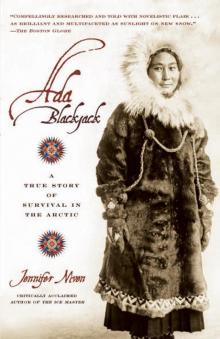 Ada Blackjack: A True Story of Survival in the Arctic
Ada Blackjack: A True Story of Survival in the Arctic The Aqua Net Diaries: Big Hair, Big Dreams, Small Town
The Aqua Net Diaries: Big Hair, Big Dreams, Small Town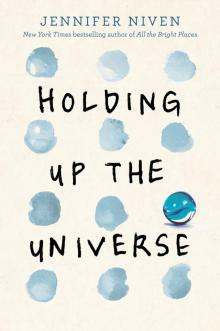 Holding Up the Universe
Holding Up the Universe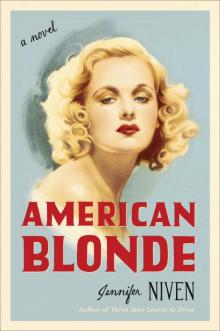 American Blonde
American Blonde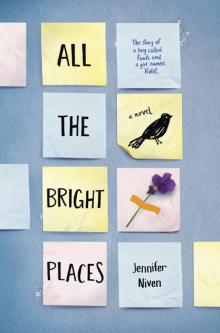 All the Bright Places
All the Bright Places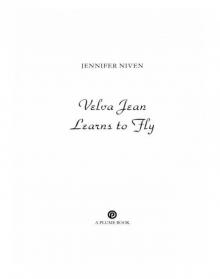 Velva Jean Learns to Fly
Velva Jean Learns to Fly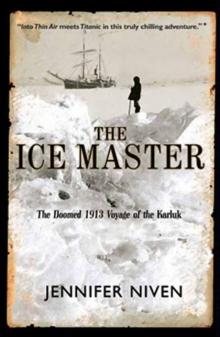 The Ice Master
The Ice Master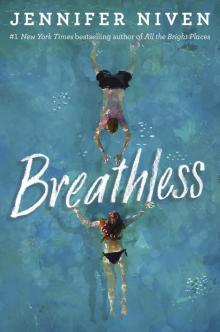 Breathless
Breathless The Aqua Net Diaries
The Aqua Net Diaries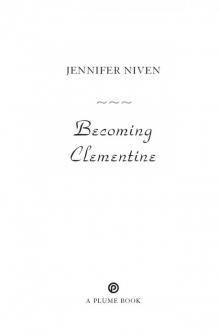 Becoming Clementine: A Novel
Becoming Clementine: A Novel